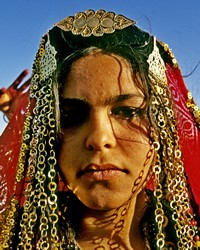Berber, Tataouine in Tunisia

Photo Source:
Copyrighted © 2026
Andrzej Lisowski Travel - Shutterstock All rights reserved. Used with permission |
Send Joshua Project a map of this people group.
|
| People Name: | Berber, Tataouine |
| Country: | Tunisia |
| 10/40 Window: | Yes |
| Population: | 4,800 |
| World Population: | 4,800 |
| Primary Language: | Nafusi |
| Primary Religion: | Islam |
| Christian Adherents: | 0.00 % |
| Evangelicals: | 0.00 % |
| Scripture: | Portions |
| Ministry Resources: | Yes |
| Jesus Film: | No |
| Audio Recordings: | No |
| People Cluster: | Berber-Saharan |
| Affinity Bloc: | Arab World |
| Progress Level: |
|
Introduction / History
The Amazigh, also known as Berbers, are the indigenous people of North Africa. They are a strong and proud people. The very name Amazigh is often translated to mean "free or noble men." There were people from North Africa present in Jerusalem at the day of Pentecost. There was a church among Berbers in the early centuries of Christianity, and some of the great North African church fathers were of Berber heritage. One can still find the symbolism of the cross throughout Amazigh architecture, designs on handmade carpets, and even tattoos on women's faces. Today, however, they have no understanding of their Christian heritage.
There are many Berber Amazigh tribes in Tunisia and the rest of North Africa. One of them is the Tataouine. When Islam swept through North Africa in the 7th century, many pockets of the Amazigh tried to fight the invasion. They resisted Islam's advance ten different times in history, outwardly saying they would become Muslims, but then returning to their villages and refusing to practice the religion. They intentionally built conspicuous white mosques at the top of the mountains to deceive Muslim invaders. As they passed, seeing the mosque in the distance, they would assume the village had already converted and went elsewhere. Early generations kept their Christian heritage in secret and outwardly submitted to Islamic rule.
What Are Their Lives Like?
The way of life for the Tataouine Amazigh differs from the other groups around them, especially in their interaction between men and women. Their interactions follow more of Bedouin habits that came with Islam from the Arabian Peninsula. Men and women do not mix socially. The Tataouine Amazigh speak their own language from childhood, but do not write it. They learn Arabic, French and some English at school. The Tataouine Amazigh use media like the radio, but they don't own other means of media, and there is no network for mobile phones.
What Are Their Beliefs?
The Tataouine Amazigh are Muslims, following the Ibadi school of Islam, which differs from both Sunni and Shia Islam. They differ from most of the rest of the Amazigh in Tunisia, who follow the Ibadi school, because they have no understanding of what being Ibadi means. The Tataouine Amazigh have been highly influenced by the Maliki teaching in the province of Tataouine. They do not recognize the Ibadi school. The Tunisian Arab's Islamic preaching has convinced the Tataouine Amazigh that Ibadis are savages and that no one should work with them. Muslims follow the teaching of Mohammad, who lived in the 6-7th centuries in Saudi Arabia. They believe in one God, whom they call Allah (Arabic for "the God"). At judgment day, all people will be judged for their deeds and, if their good works outweigh their bad, then Allah will welcome them into paradise. If not, then they will be sentenced to eternal hell. They are expected to follow the five pillars of Islam: prayer five times a day, fasting from dawn to dusk during the month of Ramadan, giving to the poor, and, if possible, a pilgrimage to Mecca, to be done at least once in their lifetime (Hajj). Regarding Jesus, they believe that he was a prophet, but that his teachings are inferior to those of Mohammad.
What Are Their Needs?
The Tataouine Amazigh people need a reliable source of safe drinking water. They are adept at finding water, but it is almost always in short supply.
Prayer Points
Pray for the Tataouine Amazigh to put their identity and hope in Jesus Christ rather than ethnicity or religion.
Pray for spiritual hunger that will give the Tataouine Amazigh a willingness to look to Jesus Christ for life's answers.
Pray for Holy Spirit anointed workers to go to the Tataouine Amazigh in Tunisia.
Pray for a mass movement to Christ among the Tataouine Amazigh people.